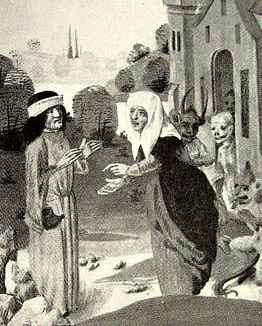A more skeptical view
In contrast to believers like James*, there were skeptics like Reginald Scot, who maintained in his Discoverie of Witchcraft (1584) that those who were persecuted as witches were ill, foolish, deluded or senile.
Scot argued that their claimed effects (blasting crops, rendering cattle or people sterile, burning houses and so on) were coincidental. He did not, however, suggest that witches did not exist: many women believed themselves to be witches, and many people believed that these witches had extraordinary powers, but both (he maintained) were deceived. All phenomena were the will of God, not the result of witchcraft.
God or witches?
The fables of witchcraft have taken so fast hold and deep root in the heart of man, that few or none can (nowadays) with patience endure the hand and correction of God. For if any adversity, grief, sickness, loss of children, corn, cattle, or liberty happen unto them, by and by they exclaim upon witches; as though there were no God in Israel that ordereth all things according to his will, punishing both just and unjust with griefs, plagues, and afflictions in manner and form as he thinketh good, but that certain old women here on earth, called witches, must needs be the contrivers of all men's calamities. . .
Such faithless people (I say) are also persuaded that neither hail nor snow, thunder nor lightning, rain nor tempestuous winds come from the heavens at the commandment of God, but are raised by the cunning and power of witches and conjurers, insomuch as a clap of thunder, or a gale of wind is no sooner heard, but either they run to ring bells, or cry out to burn witches. . .
But if all the devils in hell were dead, and all the witches in England burnt or hanged, I warrant you we should not fail to have rain, hail, and tempests as now we have, according to the appointment and will of God, and according to the constitution of the elements, and the course of the planets, wherein God hath set a perfect and perpetual order*.
(The Discoverie of Witchcraft, introduced by Hugh Williamson. Carbondale, Ill.: Southern Illinois University Press, 1964, pp. 25-26.)
Footnotes
-
Scot and James I
In his Daemonologie (1597), King James VI of Scotland, later James I of England, denounced Scot as a Sadducee (a materialist), and had his book publicly burned.
-
Order everywhere. . .
This is another example of the Renaissance belief in an overarching order in human affairs.
